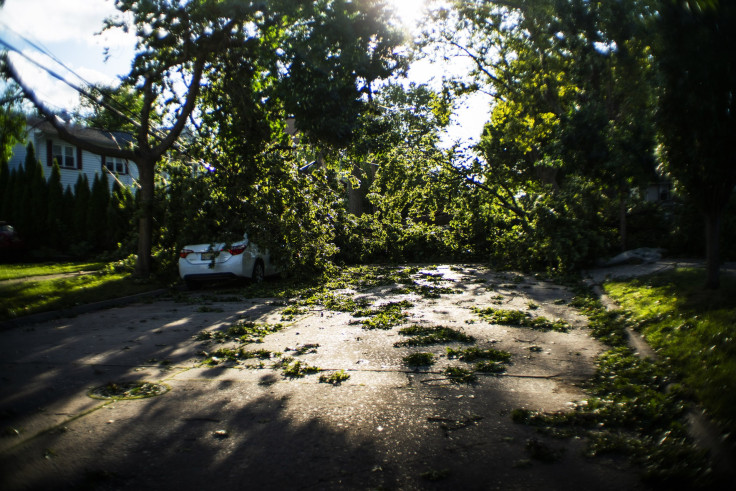Thousands Without Power In Iowa After Derecho; Heat Wave Causes Rolling Blackouts In California

KEY POINTS
- Around 30,000 customers in Cedar Rapids, Iowa, were still without power a week after a derecho ripped through the Midwest
- President Donald Trump is scheduled to visit Cedar Rapids to survey the damage caused by the storm
- Rolling blackouts were implemented in California due to a heatwave creating power shortages and strain on grid
A powerful derecho in the Midwest and extreme heat in California have left thousands without power and raised questions about the response to the devastating weather..
Iowa, in particular, is still in relatively bad shape a week after the storm ripped through the state. As of Tuesday, over 30,000 customers were still without power in Cedar Rapids, Iowa, alone. Many locals have also struggled to find food, shelter, and supplies in the past week.
“It’s hitting hard. The financial aspect is the hardest part, making sure we have money for everything,” resident Pamela Smith told Cedar Rapids' ABC-TV affiliate KCRG.
Smith said her family was forced to throw out about $400 in groceries after the storm and they have draped tarps over their roof until it can be repaired. She said they haven’t been given a timeline by their landlord, who is dealing with multiple damaged properties. However, she did thank the local resource centers for keeping her family fed during recovery.
President Donald Trump said Monday he approved “full” emergency relief for Iowa after a request by Gov. Kim Reynolds for assistance. However, the Federal Emergency Management Agency clarified this was not the case and public assistance had only been approved for 16 counties in Iowa. Individual assistance for another 27 counties was still under review.
“While I am appreciative of the president’s quick action in approving Public Assistance for Iowa communities to cleanup and rebuild, I’m deeply disappointed he has not granted the State of Iowa’s full request for Individual Assistance, including assistance to individuals and homeowners, in response to the derecho storm that devastated Cedar Rapids and communities across eastern Iowa,” Rep. Abby Finkenauer, D-Iowa, said in a press release. “We must ensure no Iowan is left behind by this tragedy. I ask the president to rectify his omission immediately.”
“I will continue fighting for a fast and comprehensive review of the impacts of this storm on Iowa families and businesses — and all necessary and appropriate federal relief for families as well as local governments.”
Trump is scheduled to visit Cedar Rapids on Tuesday to survey the damage left by the derecho.
The situation in the Midwest echoes of the damage Hurricane Isaias caused in the U.S. Northeast between Aug. 2 and Aug. 6. Millions were left without power for nearly a week between New York, Connecticut, and New Jersey, which led to mass backlash by residents and state officials against the power companies who appeared unprepared for the storm.
New York Gov. Andrew Cuomo and Connecticut Gov. Ned Lamont subsequently ordered investigations into the response by various power companies responsible for the regions hit by Isaias.
The West Coast has also been dealing with power struggles thanks to a heatwave that has settled over a large portion of California. Los Angeles County was reportedly between 98 and 110 degrees Monday, with surrounding areas reporting similar heat spikes.
Death Valley hit 130 degrees at its hottest point on Sunday, according to the National Weather Service.
The heat wave forced state officials to implement rolling blackouts over the weekend due to a power shortage and strain put on grids during the weekend. The decision was met by criticism from state officials, including Gov. Gavin Newsom, who said the blackouts started with little notice or preparation done to ensure residents’ safety.
“These blackouts, which occurred without warning or enough time for preparation, are unacceptable and unbefitting of the nation's largest and most innovative state,” Newsom said in a public letter to California Independent System Operator, the California Public Utilities Commission and the California Energy Commission on Monday.
“Collectively, energy regulators failed to anticipate this event and to take necessary actions to ensure reliable power to Californians. This cannot stand.”
© Copyright IBTimes 2025. All rights reserved.





















